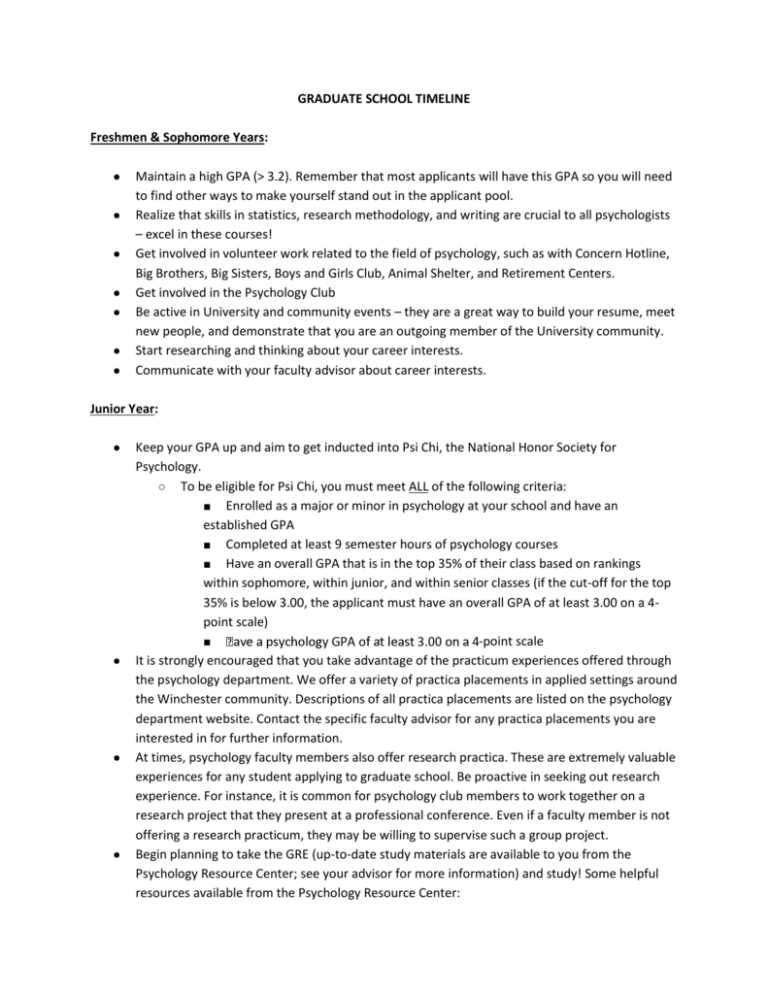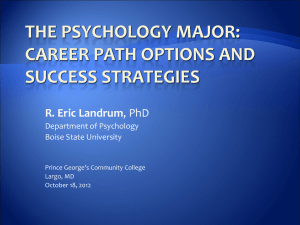GraduateSchoolTimeline[9
advertisement

GRADUATE SCHOOL TIMELINE Freshmen & Sophomore Years: ● ● ● ● ● ● ● Maintain a high GPA (> 3.2). Remember that most applicants will have this GPA so you will need to find other ways to make yourself stand out in the applicant pool. Realize that skills in statistics, research methodology, and writing are crucial to all psychologists – excel in these courses! Get involved in volunteer work related to the field of psychology, such as with Concern Hotline, Big Brothers, Big Sisters, Boys and Girls Club, Animal Shelter, and Retirement Centers. Get involved in the Psychology Club Be active in University and community events – they are a great way to build your resume, meet new people, and demonstrate that you are an outgoing member of the University community. Start researching and thinking about your career interests. Communicate with your faculty advisor about career interests. Junior Year: ● ● ● ● Keep your GPA up and aim to get inducted into Psi Chi, the National Honor Society for Psychology. ○ To be eligible for Psi Chi, you must meet ALL of the following criteria: ■ Enrolled as a major or minor in psychology at your school and have an established GPA ■ Completed at least 9 semester hours of psychology courses ■ Have an overall GPA that is in the top 35% of their class based on rankings within sophomore, within junior, and within senior classes (if the cut-off for the top 35% is below 3.00, the applicant must have an overall GPA of at least 3.00 on a 4point scale) ■ -point scale It is strongly encouraged that you take advantage of the practicum experiences offered through the psychology department. We offer a variety of practica placements in applied settings around the Winchester community. Descriptions of all practica placements are listed on the psychology department website. Contact the specific faculty advisor for any practica placements you are interested in for further information. At times, psychology faculty members also offer research practica. These are extremely valuable experiences for any student applying to graduate school. Be proactive in seeking out research experience. For instance, it is common for psychology club members to work together on a research project that they present at a professional conference. Even if a faculty member is not offering a research practicum, they may be willing to supervise such a group project. Begin planning to take the GRE (up-to-date study materials are available to you from the Psychology Resource Center; see your advisor for more information) and study! Some helpful resources available from the Psychology Resource Center: ○ ● Cracking the Revised GRE Identify the type of program that you would like to pursue. First, decide whether you want to get a master’s or doctorate. Then, identify a particular career or subfield of psychology that you want to pursue, such as: social, personality, developmental, cognitive, clinical, counseling, school, forensic, experimental, community, cross-cultural, health, quantitative, biopsychology and neuropsychology. Summer Following Junior Year: ● ● ● Time to select the schools that you are interested in. Do not underestimate the time it will take you to thoroughly research schools and select those that fit your needs the best. ○ Some helpful resources available from the Psychology Resource Center: ■ American Psychological Association Graduate Study in Psychology ■ Insider’s Guide to Graduate Programs in Clinical and Counseling Psychology ○ Find out what the programs offer in terms of monetary assistance - Most master's programs do not offer assistance so you likely will need to look into student loans. On the other hand, most Ph.D. programs offer assistantships or fellowships to help pay for living expenses and tuition costs. ○ If you are applying to clinical programs, it is strongly recommended that you apply to programs that are accredited by the American Psychological Association. Take the GRE. Many programs have cutoff scores, so plan enough in advance that you have the option to take the GRE twice, once in the summer and once in the fall of your senior year. ○ The GRE was changed in August 2011 and now is called the GRE Revised General Test. The revised test has new types of questions and includes questions that tap skills necessary for success in graduate study (ETS website). There are three areas of questions: verbal reasoning, quantitative reasoning, and analytical writing. ■ Verbal reasoning: “Analyze and draw conclusions from discourse; select important points; understand the meaning of words, sentences, and entire texts” (ETS website) ■ Quantitative reasoning: “Understand quantitative information, interpret and analyze quantitative informaton, solve problems using mathematical models, and apply basic mathematical skills” (ETS website) ■ Analytical Writing: “Articulate complex ideas clearly and effectively; support ideas with relevant reasons and examples, examine claims and accompanying evidence, sustain a well-focused coherent discussion” (ETS website) Work on personal statement ○ Your personal statement should answer why you are applying to graduate school, what interests you have about the particular program and what you hope to accomplish with a graduate degree. ○ Pay attention to page length. Personal statements typically should be no more than 2 pages in length. Remember the programs are reading many applications so they appreciate when you get to the point and are concise. ○ ○ ○ ○ Sometimes programs have additional questions to answer that are unique to their programs. Ask peers and/or professors to review them. You likely will have multiple drafts before the final product. Research each program and identify particular faculty with whom you would like to work. If time permits, read journal articles published by those faculty so you can refer to them in your personal statement (e.g., what you think is interesting about their research and why). If you have any concerns about your application packet, you may include a few sentences near the end of your personal statement to address these concerns. For example, if you had a particularly bad semester in college, resulting in a lower GPA, you might want to explain what happened and what you have done since to improve. Senior Year: ● ● ● ● ● ● Keep up the GPA! If necessary, take the GRE again to improve your scores. Prepare applications! Applications are typically due in December, January, or February. Request letters of recommendation. Most graduate programs ask for three letters of recommendation. Prior to asking for your letters, consider who knows you the best and can say the most about you as a student and as an individual. Make sure you ask your letter writers well in advance of the applications' deadlines (i.e., at least one month). Once you have secured your letter writers, provide the following information to them: (1) Your overall GPA, (2) Your Psychology GPA, (3) Your most recent resume, (4) A brief statement of your career goals, (5) A list of programs to which you are applying and their [snail] mailing addresses, (6) Any recommendation forms provided by the particular programs, and (7) Instructions for completing the letters. Some letters can be [snail] mailed, some can be e-mailed, and yet others are uploaded to an application service. Order official transcripts and/or send them to your graduate programs. Establish a PLAN B. The unfortunate reality is that graduate school is very competitive so even the brightest and experienced students might not get in. Therefore, you want to have a plan B already in place. This likely will involve working in an entry-level position, gaining more realworld experience, and strengthening areas of your resume that appear weaker. For example, if you do not have a lot of research experience, contact professors to see if you can get involved in their research. After a year or two, you can re-apply to graduate school and include your additional experiences in your application.



